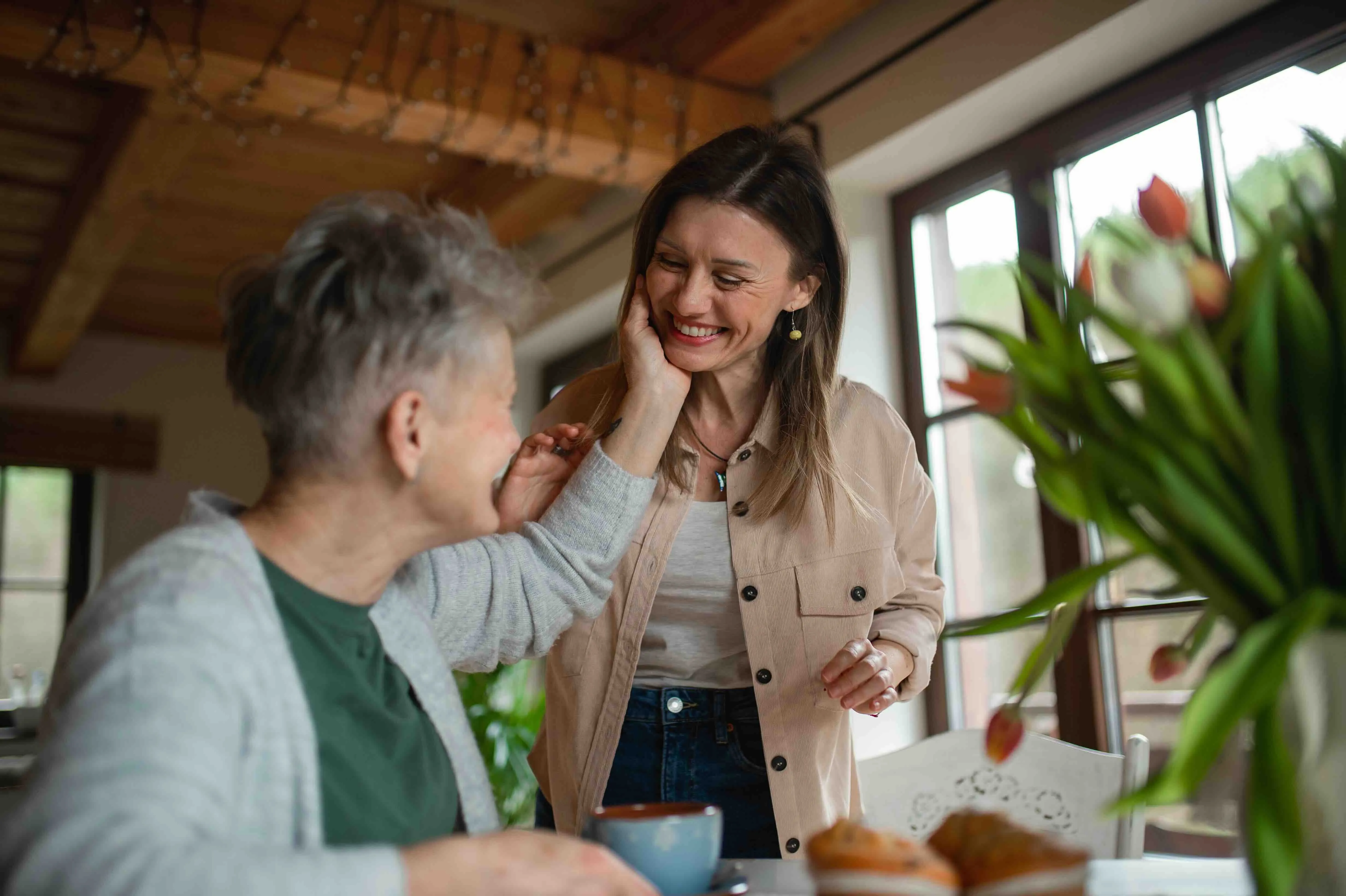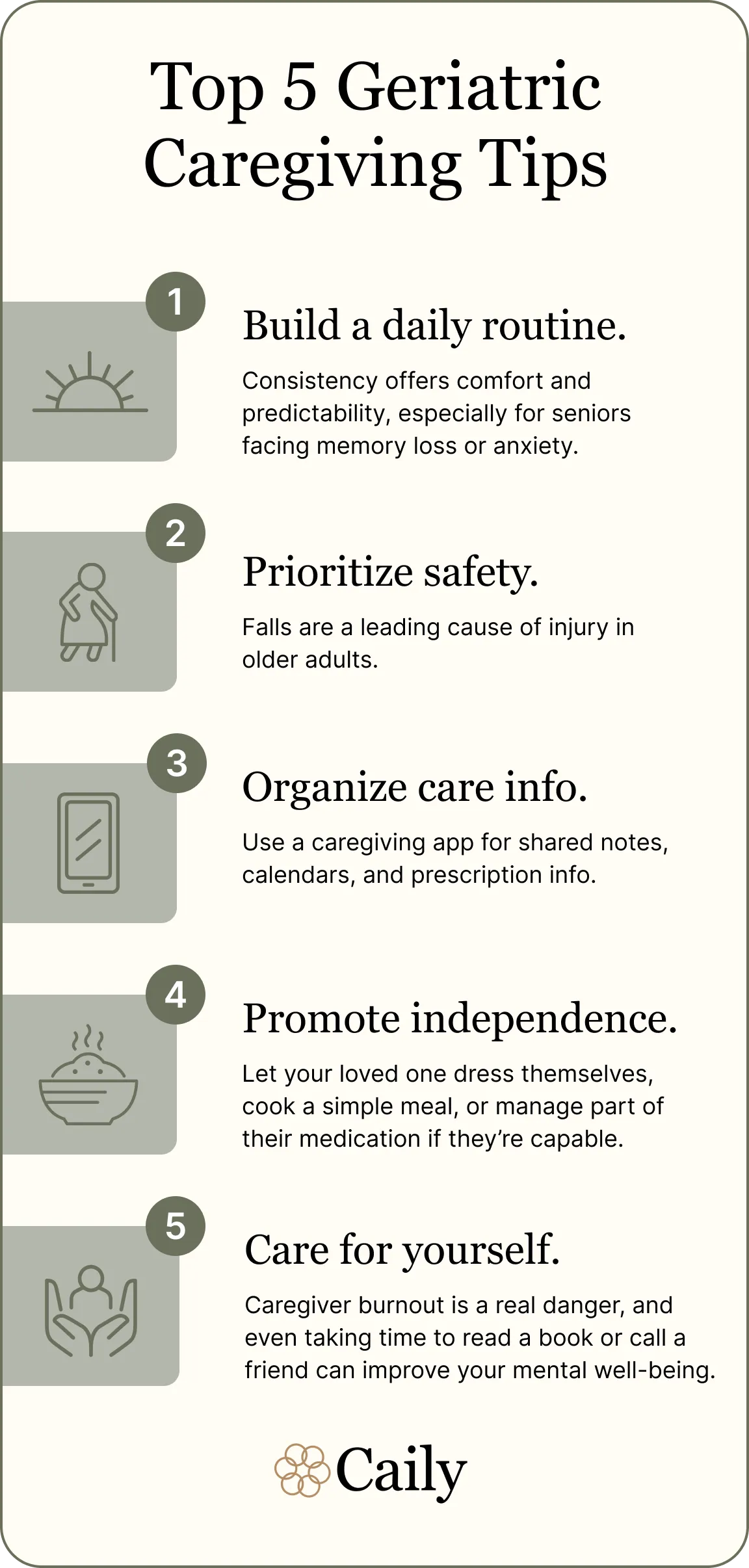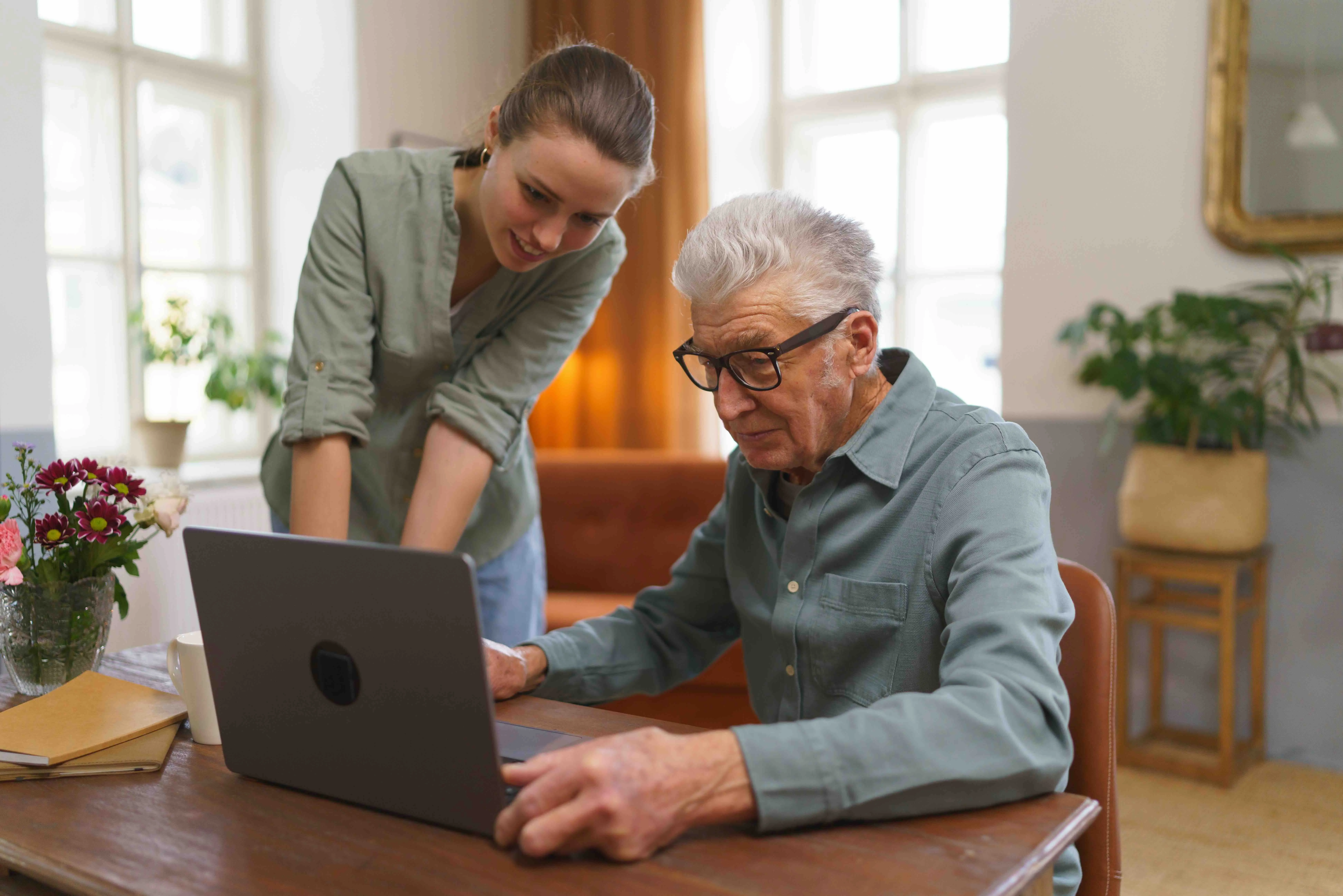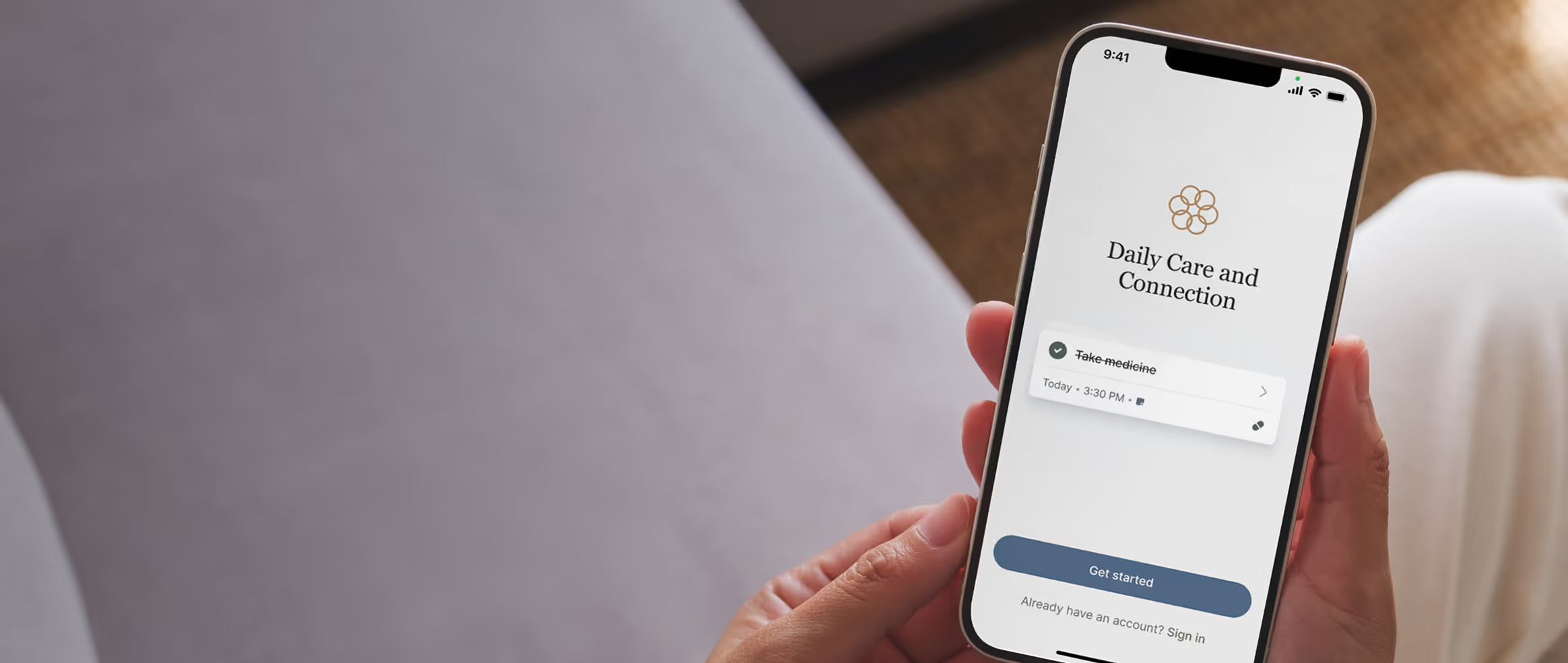Geriatric Caregiving Tips: Caring for Aging Loved Ones

As the average life expectancy continues to grow, more families find themselves caring for aging parents and grandparents. For first-time caregivers, stepping into this role can be both deeply meaningful and incredibly daunting. Geriatric caregiving requires a careful balance of emotional support, physical assistance, and logistical organization.
Whether you're juggling family caregiver support with a full-time job, managing siblings with differing opinions, or simply learning to advocate for your loved one, you should know that you're not alone. This blog is packed with geriatric care best practices to help you provide the most effective possible care, reduce your stress, and find joy in the process.
You’ll also learn how Caily can make your journey smoother by organizing everything from appointments to medication logs in one easy and accessible place.
Understanding Geriatric Caregiving
When you think to the day that you yourself may need elderly care, you may assume that you'll need certain things, but it's important to remember that each person is unique. What sounds like extending a helpful hand to you may be seen as overreaching to your care receiver. Make sure you're communicating clearly and understanding what your elderly loved one needs and wants during every step of the caregiving journey.
What Makes Geriatric Care Unique
Geriatric caregiving isn't just about aging, it's about adapting care to meet physical, cognitive, and emotional changes. Older adults may face chronic illnesses, memory decline, and mobility issues that require a thoughtful, personalized approach. This often involves managing multiple medications, frequent healthcare appointments, and helping with activities of daily living like bathing or eating.
Yet, it also includes more than just medical support. Many older adults wrestle with a loss of independence, grief, or social isolation. As a caregiver, you’re offering not just hands-on help, but emotional companionship and advocacy.
Emotional Dynamics in Family Caregiving
Family caregiving often stirs a mix of emotions. Watching a parent decline can be heartbreaking and uncomfortable for the sudden shift of roles and family dynamics that come as a result. You may feel guilt for not doing enough, frustration over family disagreements, or exhaustion from trying to do it all.
You might also feel moments of closeness and gratitude, like when your loved one smiles, when they share a story from their youth, or when you see their relief at your presence. Recognizing and processing this emotional rollercoaster is vital for your long-term wellbeing.
Recognizing Signs Your Loved One Needs Support
Not sure when to step in? Watch for red flags like:
- Missed medication or appointments
- Neglected hygiene or poor nutrition
- Increased forgetfulness or confusion
- Isolation or depression
- Frequent falls or safety concerns
If any of these sound familiar, it may be time to take on a caregiving role, or coordinate care with tools like Caily, which lets you easily monitor well-being and schedule tasks collaboratively with other loved ones or professional caregivers.

Essential Tips for Geriatric Caregivers
The best elderly care advice isn't just about being present and aware of pending appointments, it's about transforming your loved one's life for the better. Think about the times they most likely feel confused or isolated, and use those moments to offer help and companionship.
Establish a Daily Care Routine
Consistency offers comfort and predictability, especially for seniors facing memory loss or anxiety. Try to build a schedule for meals, medication, hygiene, rest, and leisure. A structured day can minimize confusion and reduce resistance to care.
Use color-coded calendars or caregiving apps like Caily to manage daily plans and delegate tasks among family members.
Prioritize Safety in the Home
Falls are a leading cause of injury in older adults. Start with a home safety audit:
- Remove rugs and clutter
- Install grab bars in bathrooms
- Improve lighting in hallways
- Use non-slip mats in showers
- Ensure mobility aids are in good condition
Check regularly for new risks as mobility or vision changes over time.
Encourage Independence Where Possible
Fostering independence preserves dignity. If your loved one is capable, let them dress themselves, cook a simple meal, or manage part of their medication. This builds confidence and reduces their feelings of helplessness and frustration.
Encourage the use of assistive devices (e.g., walkers, large-button phones) to support autonomy without compromising safety.
Stay Organized with Meds and Appointments
Most elderly individuals take multiple prescriptions, often from different specialists. Errors are common, and can be dangerous.
- Keep a medication list with dosage and timing
- Use pill organizers and alarm reminders
- Attend doctor visits with a list of concerns
- Track vitals like blood pressure or glucose if needed
Caily simplifies medications with built-in logs and shared care notes, so nothing falls through the cracks.
Communicate Openly and Kindly
Speak clearly, avoid patronizing language, and include your loved one in decisions. Validate their feelings, even if they don’t fully understand the situation. Avoid arguments; redirect gently when needed, especially in cases of cognitive decline.
Good communication with family members is also essential. Schedule regular check-ins to discuss responsibilities and challenges.
Managing Caregiver Stress and Burnout
While your geriatric loved one is your priority, it can be remarkably easy to lose track of your own happiness and comfort. Particularly if you're juggling caregiving alongside other obligations, like supporting your own family or working a full-time job, you can very quickly get burnt out.
The Importance of Self-Care
Caregivers often neglect themselves, but your well-being directly affects the quality of care you can provide. Protect your physical and mental health by:
- Getting regular sleep
- Eating balanced meals
- Taking breaks
- Staying active; even short walks help
Block time on your calendar just for you, even if it’s 20 minutes to read or call a friend.
Seeking Support (Family, Professionals, or Groups)
You don’t need to provide care for your elderly loved one alone. Enlist help:
- Delegate tasks to siblings or a hired aide. You may be surprised how willing your family is to help out, they just may be hesitant to step on your toes or overcomplicate the caregiving schedule. By proactively reaching out and pointedly assigning them certain things, they can help shoulder the caregiving tasks.
- Join local support groups or online forums. From Reddit to Facebook Groups, there are a myriad of options for online forums specifically created for providing Caregivers companionship and a place to vent. There may also be local support groups that you could visit in person.
- Access respite care so you can rest. When you're really feeling spent, there are respite care options that could watch your loved one and give you some relief to organize, take a long shower, or catch up on missed work.
Organizations like AARP and the Family Caregiver Alliance offer support networks, training, and financial guidance that could give you beneficial caregiving peace of mind.
Using Technology to Ease the Burden
Digital caregiving tools are lifesavers. We specifically built Caily for caregivers and their care receivers, with features like:
- Shared calendars for family coordination
- Document storage for advance directives or insurance
- Secure chat threads for care teams
- Reminders for tasks and medications
These tools reduce the mental load and improve collaboration among multiple Caregivers.
Resources for Geriatric Caregivers
Although it can feel like you're alone as a geriatric caregiver, there are countless other people in similar situations. Aside from support groups to commiserate with, your local city likely also has agencies specifically created to help elderly people in your area.
Local Aging Agencies and Home Health Providers
Connect with your Area Agency on Aging (AAA) for:
- Transportation services
- Meal delivery
- In-home health assessments
- Legal and financial resources
Search Eldercare Locator for services near you.
Online Communities and Apps
Caregiving doesn’t have to be isolating. Online platforms offer both tools and emotional support.
Caily empowers caregivers by:
- Tracking care routines
- Coordinating with family and professionals
- Managing documents like POAs and insurance info
- Accessing caregiving tips and checklists
Having a reliable community is especially valuable for sandwich generation caregivers balancing kids, work, and elder care. It can be a lot to juggle, and you can easily lose sight of your personal needs when your whole day is consumed by caring for others.
Financial Planning Tools for Elder Care
Unfortunately, healthcare can cost a lot of money. On top of all the other emotional and physical stresses, elder care can also strain finances. Start with:
- Reviewing Medicare/Medicaid eligibility
- Exploring long-term care insurance
- Creating a power of attorney
- Meeting with a financial advisor
Sites like the National Institute on Aging and AARP's Caregiving Resources offer worksheets and planning guides to help you get started.
Use the Right Tools
Geriatric caregiving is a profound responsibility, and an opportunity to honor a loved one. By approaching the role with empathy, structure, and the right technology, you can improve not only their life but your own.
Try Caily free today to organize your caregiving tasks and connect with your care team!

FAQs About Geriatric Caregiving
What is elder care?
Elder care refers to a broad range of services and support designed to meet the unique needs of older adults. It can include everything from help with daily activities—like bathing, dressing, and meal preparation—to medical assistance, companionship, transportation, and end-of-life planning.
Elder care can be provided in a variety of settings, including:
- At home through in-home care or family caregiving
- Assisted living communities
- Skilled nursing facilities
- Adult day care centers
The goal of elder care is to maintain quality of life, dignity, and independence for seniors as they age. Tools like Caily help families coordinate this care seamlessly across medical providers, caregivers, and loved ones through tailor-made caregiving features like shared notes, coordinated calendars, and medication and vital logs.
How to pay for elder care?
Determining how to pay for elder care depends on the type of care needed, the length of time it’s required, and available financial resources. Here are some common payment options:
- Medicare: Covers limited short-term care (e.g., post-hospital rehab), but not long-term custodial care.
- Medicaid: May cover long-term care for low-income seniors, including nursing home and some in-home services.
- Private Pay: Many families pay out-of-pocket using savings, pensions, or retirement income.
- Long-Term Care Insurance: These policies cover services not typically paid for by health insurance.
- Veterans Benefits: Eligible veterans may receive aid through VA programs for in-home or facility-based care.
- Life Insurance or Reverse Mortgages: Can sometimes be leveraged to access funds for elder care.
Planning ahead and consulting with a financial advisor or elder law attorney can help ensure that your available resources are used effectively.
What is respite care for elderly?
Respite care provides temporary relief for primary caregivers by offering short-term assistance with elder care duties. It can range from a few hours a week to several days or weeks of coverage, and is designed to give caregivers time to rest, travel, or attend to other responsibilities.
Respite care services can be provided:
- At home from friends, family, and neighbors
- At home by a professional caregiver
- In adult day care centers
- In residential facilities or assisted living centers
Taking regular breaks is essential to avoid caregiver burnout. Platforms like Caily make it easier to plan respite care, share updates with others in the care circle, and ensure continuity even when you step away.
How can technology help with geriatric caregiving?
When you're caring for an elderly loved one, tasks can pile up quickly. Especially if you spend your day working a job or supporting a family, geriatric caregiving can quickly push you to burnout.
Caily is the all-in-one caregiving app built specifically for caregiving, including features like last-wishes planning, document storage, medication reminders, and shared calendars. By tracking everything in one unified place, caregiving apps can keep everyone on the same page.

Get Started Now
Enjoy full access to everything Caily offers, from medication tracking to shared schedules and daily check-ins. See how much easier caregiving can be when everything is coordinated in one place.
Start your free trial



